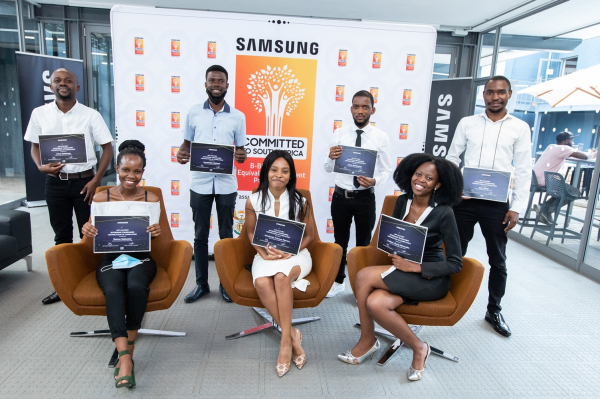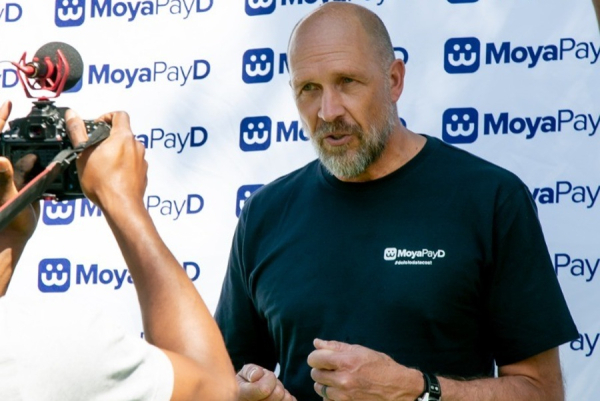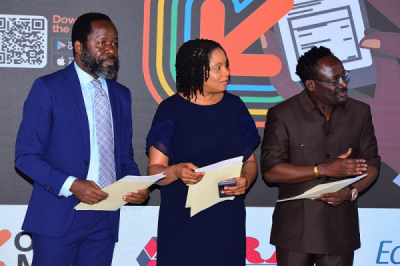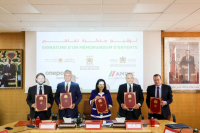Many South African SMEs face serious hurdles like lack of financing, limited market access, and skills shortages. These challenges slow their growth in the ICT sector. Samsung is stepping up its support to tackle these problems head-on.
On July 21, Samsung, the South Korean electronics giant, announced a new phase of its Enterprise Equity Investment Program (EEIP). The program runs in partnership with South Africa’s Department of Trade, Industry and Competition (DTIC). This phase targets Black-owned SMEs in information and communications technology, focusing especially on emerging startups and women entrepreneurs.
Nicky Beukes, EEIP project director at Samsung South Africa, said, “This is our way of ensuring that we empower South Africa’s digital future by helping ICT entrepreneurs thrive as we deepen our commitment and collaboration with DTIC[...] As Samsung, we also understand how much entrepreneurship contributes to job creation, community development and how it fosters innovation and drives economic growth.”
Launched in 2019, the program aligns with South Africa’s National Development Plan (NDP) for 2030 and the Black Economic Empowerment policy (B-BBEE). It funds with 280 million rand (about $15.9 million) to address key barriers faced by small businesses: limited capital, a shortage of technical skills, difficult market integration, and digital risks.
For this third phase, Samsung broadens eligibility to include more early-stage startups. It also boosts female participation in technology sectors. This move aims to build a more representative digital ecosystem and unlock innovation potential in traditionally underrepresented groups.
The program offers intensive training, mentoring, management support, and focused grants to help SMEs grow. Recently, several supported SMEs have established themselves in repair services and technology hubs. Through the EEIP, Samsung hopes to drive a resilient and inclusive digital economy in South Africa.
This article was initially published in English by Samira Njoya
Edited in English by Ange Jason Quenum
He focuses on access and cost issues in the digital sector. He closely monitors the realities of emerging markets and is committed to solutions tailored to local constraints.
Gour Lentell, a Zimbabwean entrepreneur based in Johannesburg, is the co-founder and CEO of Datafree Technologies, a company specializing in mobile data optimization.
Founded in 2008, Datafree Technologies aims to eliminate mobile data costs to expand digital access in emerging markets. Its model applies the toll-free number principle to mobile internet, allowing users to access websites, applications, and online content without using their data plans or airtime. The companies offering these online services cover the connection cost.
Datafree Technologies partners with mobile network operators by installing a system that identifies user traffic and bills client companies. It offers a cloud platform that allows businesses to manage their data free services by creating dedicated domains, setting quotas, monitoring usage, and generating analytical reports.
Lentell is also the founder and CEO of MoyaApp, a super-app offering data-free messaging and other content accessible without a data plan. MoyaApp has over 6.5 million monthly active users in South Africa and is developed by Datafree Technologies.
Before founding these ventures, Lentell co-founded Sabela Media in 1998, a real-time behavioral targeting ad server technology company, where he served as Executive Chairman until 2000. In 2001, he co-founded Decide Interactive Pty Ltd, serving as Executive Director until 2005.
Lentell graduated from Lancaster University in 1985 with a bachelor's degree in operational research. His professional career began in 1987 at PricewaterhouseCoopers (PwC) as a management consultant in London, England, and Sydney, Australia. Between 1992 and 1996, he worked at technology company Oracle in Australia as Industry Consulting Director.
Melchior Koba
-
Liberia launches mobile tax payment system via *144#, in partnership with Orange Money and Ecobank.
-
Covers 18 government agencies; no internet needed; users get SMS confirmation.
-
Aims to boost inclusion, transparency, and revenue through digital access.
The Liberia Revenue Authority (LRA) finalized an agreement on Wednesday, July 23, with Orange Money Liberia and Ecobank for a new digital system. This system will allow citizens to pay taxes and public fees directly via their mobile phones.
“In just five quick steps, a taxpayer can complete a transaction, receive confirmation, and move on with their day,” said Maxwell Dodd, CEO of Orange Money Liberia. “We are excited to partner with the LRA and Ecobank to help modernize Liberia's tax system.”
Taxpayers can now make payments by dialing the USSD code *144#, without needing an internet connection. By entering their Tax Identification Number (TIN), the amount due, and the type of payment, they instantly receive an SMS confirmation. The service already covers 18 ministries and government agencies. Public officials have been trained to ensure its effective rollout.
The initiative aims to simplify tax payments, especially for populations living far from urban centers. It also enhances the transparency and traceability of public revenue. It promotes financial inclusion by being accessible to anyone with a mobile phone.
In the medium term, this platform could help broaden the tax base, increase state revenue, and improve administrative efficiency. Liberia is aligning with a regional trend where mobile finance is becoming a tool for transforming public services. In the longer term, this public-private partnership model could inspire other West African countries as they transition toward more digital, inclusive, and locally adapted governance.
Adoni Conrad Quenum
This partnership brings together two influential players to strengthen Africa’s innovation and startup ecosystems — critical drivers of job creation, digital transformation, and economic growth.
AfriLabs, the pan-African network of innovation hubs, has signed a collaboration agreement with Kenya’s Konza Technopolis Development Authority (KoTDA) to catalyze inclusive technology development, foster entrepreneurship, and expand Africa’s innovation economy. The agreement was announced July 18 and comes ahead of the highly anticipated 10th edition of the AfriLabs Annual Gathering (AAG2025), scheduled to take place in Nairobi from October 7–9.
AfriLabs Executive Director Anna Ekeledo said, “This partnership represents our shared commitment to scaling African innovation through collaborative infrastructure, talent exchange, and knowledge networks. We’re proud to work alongside Konza Technopolis as we expand our mission to empower Africa’s next generation of innovators.”
The collaboration brings together two influential institutions working at the crossroads of innovation policy and sustainable development. Together, AfriLabs and Konza will co-design and implement programs that support startups, enhance ecosystem capacity, facilitate cross-border collaboration, and unlock investment opportunities across the continent.
Konza Technopolis will serve as the Strategic Government Partner for AAG2025 — a flagship event under the new partnership. In this role, KoTDA will mobilize national stakeholders, host thematic exhibitions, and facilitate high-level participation to shape the event’s central theme: “Africa’s Innovation Future: Policy, Partnerships, and Progress.”
The collaboration focuses on developing soft-landing programs, joint ventures, and innovation showcases; supporting IP registration and tech transfer; and conducting joint research in AI, clean tech, health tech, and smart infrastructure. It also includes training bootcamps and knowledge-sharing for innovators and policymakers, linking Konza-based startups to AfriLabs’ Catalytic Africa fund and investor network, facilitating cross-border startup exchanges, and using Konza’s infrastructure as a testbed for smart city and IoT solutions.
With a network spanning 53 African countries, AfriLabs is poised to leverage its extensive reach to deepen impact through this long-term partnership. The collaboration also aligns with Konza’s mission to drive Kenya’s digital transformation through innovation-driven development.
Konza Technopolis, often referred to as Africa’s Silicon Savannah, is a flagship Smart City initiative under Kenya’s Vision 2030—the national blueprint to position Kenya as a newly industrializing, middle-income economy. The city is envisioned to contribute at least 2% to Kenya’s GDP, reinforcing the country’s role as a premier tech and innovation hub on the continent—making it a fitting strategic partner for the 2025 AfriLabs Annual Gathering and broader pan-African innovation efforts.
The partnership benefits a wide range of stakeholders: startups and innovators gain access to funding, mentorship, and real-world test environments; youth and digital professionals benefit from upskilling opportunities and enhanced job readiness; governments and policymakers are supported with research-backed strategies to advance smart cities and digital public infrastructure; and investors and ecosystem enablers gain exposure to a pipeline of more investable and scalable ventures.
Hikmatu Bilali
AI tools are often built without African data or languages in mind. Google’s investments ensure Africa’s languages, cultures, and contexts are represented in the digital world. This reduces reliance on foreign tech systems and allows Africans to build for Africans — on their terms.
Google has announced a $37 million commitment to strengthen research, education, infrastructure, and innovation across the continent. The announcement was made on Thursday, July 24, in Accra, Ghana, where the tech giant unveiled a series of new and previously unannounced initiatives to bolster Africa’s role in shaping the future of AI.
“With a young, fast-growing population and a culture of creative problem-solving, Africa brings essential perspectives to a technology that is rapidly reshaping the world. As AI continues to evolve, it is critical that African researchers, like our Google Research teams in Kenya and Ghana, developers, and organizations are equipped to lead,” said Google in a statement.
At the heart of the announcement was the launch of the AI Community Center in Accra, envisioned as a hub for learning, experimentation, and interdisciplinary collaboration. The facility will host technical workshops, research exchanges, and community events to empower students, developers, artists, and civil society actors to explore how AI can solve locally relevant challenges — from food security to language inclusion and healthcare delivery.
Among the flagship initiatives is $25 million from Google toward the AI Collaborative: Food Security, a program that will support African researchers and nonprofits developing AI tools to forecast hunger, boost crop resilience, and provide actionable insights to smallholder farmers.
To ensure linguistic diversity in AI, Google has committed $3 million to support the Masakhane African Languages AI Hub, which is building datasets, translation models, and voice technologies for more than 40 African languages — an effort aimed at digital inclusion for historically underrepresented communities.
To further deepen Africa’s research capabilities, Google has awarded $1 million grants each to two leading academic institutions: the African Institute for Data Science and Artificial Intelligence (AfriDSAI) at the University of Pretoria and the Wits MIND Institute in Johannesburg. These funds will support graduate students and postdoctoral researchers contributing to globally relevant AI advancements from an African base.
Recognizing the need for widespread upskilling, Google is expanding its Grow with Google digital education initiative. With an additional $7 million investment, the company will roll out AI skilling and safety programs in Ghana, Kenya, Nigeria, and South Africa, delivered in collaboration with academic and nonprofit partners. Topics will include AI fundamentals, cybersecurity, and online safety.
In Ghana, 100,000 Google Career Certificate scholarships are being offered to students in higher education institutions. These self-paced programs will cover AI Essentials, Prompting, Data Analytics, IT Support, and Cybersecurity — equipping young Africans with in-demand technical skills for the evolving job market.
With Africa’s startup ecosystem gaining momentum, Google is also introducing a new fund initiative targeting over 100 AI-powered startups. This support model will combine philanthropic capital, venture funding, and technical mentorship to help scale innovations tackling African challenges in healthcare, education, and agriculture.
Africa is fast emerging as a frontier for applied AI innovation. With its young, tech-savvy population, growing digital infrastructure, and pressing development challenges, the continent is uniquely positioned to shape AI that serves real-world needs.
Yet despite growing interest, Africa still lags in global AI development. According to the Oxford Insights Government AI Readiness Index (2022), Sub-Saharan Africa scored an average of 29.4, significantly below the global average of 44.6. The index measures a government’s ability to implement AI responsibly and effectively, based on factors like digital infrastructure, human capital, and public sector innovation capacity. This stark gap reflects the need for sustained investment in infrastructure, skills, and policy to ensure African countries can fully participate in and shape the future of AI. Without intentional support, the region risks being excluded from setting the global AI agenda, further widening the digital divide — a gap Google’s investments aim to bridge.
Google’s $37M investment is a strategic bet on building Africa’s AI infrastructure from within, enabling Africans to become creators, not just consumers of the next wave of global technology.
Hikmatu Bilali
Wayne Venter, a South African entrepreneur and engineer, develops cutting-edge software solutions to meet industrial needs. He founded Nulitics in 2017, a company that builds technology tools for industrial players.
Based in Johannesburg and expanding to Houston, Nulitics creates software using augmented reality, Internet of Things (IoT), and digital twin technologies. The company blends machine vision, user experience, and digitized operations to help clients improve productivity, safety, and access to information.
Nulitics offers augmented reality tools that support work in industrial, maintenance, commercial, and training sectors. Through digital twins, it builds 3D scans and connected virtual models of industrial plants, integrating real-time sensor data for better monitoring.
Nulitics develops its own products and ensures they work with hardware partners like Microsoft, Vuzix, and RealWear. This independence allows the company to tailor solutions effectively for various client needs.
Wayne Venter also leads Dulcet Consulting, a technology advisory firm. Before Nulitics, he founded Ionizr in 2016, specializing in mobile analytics and marketing campaign delivery, serving as its CTO until 2018.
He holds a double bachelor’s degree from the University of Pretoria in computer security and information systems, earned in 1993. He completed a Master’s in Information Technology from the University of Liverpool in 2013.
Venter began his career in 1990 as a network administrator at the University of Pretoria. He worked as a solutions architect at Avaya between 2012-2014 and as a pre-sales systems engineer at Ruckus Wireless from 2014-2015. Between 2015 and 2016, he directed SkyFii operations in the Middle East and Africa.
This article was initially published in French by Melchior Koba
Edited in English by Ange Jason Quenum
Developed by two tech entrepreneurs, the solution combines connectivity, energy, and access to financing. It is designed to address the challenge of financial and technological inclusion in Africa.
Mbora, a Malawian agri-fintech startup, offers rural smallholder farmers access to internet, energy, and microloans. Founded in 2020 by Adrian Raisbeck and Claudia Haak, the startup is based in Mangochi.
Through its mobile application MboraMAX, it enables access to its range of services for its users. Its integrated approach supports farmers with affordable internet and electricity, delivered via smart solar stations. The platform also provides financial services tailored to farmers' needs.
“The mboraMAX platform leverages technology and innovative microfinance with supporting financial services to empower entire communities. Focusing on farmers, women, youth, and entrepreneurs. Fostering economic growth, resilience, and sustainable development and delivering impact against the first 10 sustainable development goals,” the startup said.
A key part of Mbora's model is providing digital microloans to farmers who are often excluded from traditional banking. By collecting behavioral data on energy usage, internet activity, GPS location, and weather patterns, the startup builds credit profiles to offer targeted financing. These microloans are primarily used to purchase agricultural inputs or cover urgent expenses during the off-season.
Now operating in several villages in central Malawi, Mbora installs its stations in partnership with local communities. In addition to financial services, the infrastructure provides 4G connectivity and sustainable electricity, creating an ecosystem that fosters economic and social development. Farmers can access weather forecasts, online courses, and digital marketplaces. With this model, Mbora aims to reach 100 million people in sub-Saharan Africa by 2030.
Adoni Conrad Quenum
Nguema Etoh Ibrahim, a Franco-Gabonese entrepreneur trained in France, has launched a bold mission: transform the shared housing experience through digital innovation. Based in the Lille region, he now leads EKNA, a start-up he co-founded in 2020 with Florine Dufour.
EKNA operates through a dual-function system: a mobile app for flatmates and a platform for landlords. The mobile app allows users to find and book shared accommodation easily—regardless of their rental history. Using an algorithm-driven matching system, EKNA suggests compatible flatmates based on users' lifestyles and preferences.
For landlords, EKNA provides a dashboard to post listings, review detailed tenant profiles, and assess compatibility with current flatmates. Each application includes a rental score and a personality match indicator, streamlining the selection process.
“EKNA has been developed and now consists of a mobile application for people looking for a flat share, and a platform for landlords (private individuals or professionals) to manage their accommodation adverts and choice of flatmates! But that's just the beginning, and we promise you plenty more great features to come,” said the start-up.
Landlords can publish listings across multiple channels and reach EKNA’s entire user base. The platform also simplifies tenant rotation and communication within shared flats, making management smoother and less time-consuming.
Nguema Etoh Ibrahim holds a degree in computer-aided design and drafting from Lille’s University Institute of Technology (IUT). He started his career in 2017 as an electrical draughtsman at Société Nouvelle d'Installations Électroniques (SNIE) in France.
In 2018, he joined Inéo Infracom as a GSM design technician. He later worked at the Vincent Delsinne architecture studio as an assistant architect. In 2019, he became a works supervisor at CRITES, a firm focused on electrical engineering and communication systems.
This article was initially published in French by Melchior Koba
Edited in English by Ange Jason Quenum
Orange entered the Liberian telecom market in 2016 by acquiring Cellcom. Since then, the French company has become one of the country's leading operators.
Orange Liberia invested over $250 million between 2016, when it acquired operator Cellcom, and July 2025.
The company revealed this investment last week during the 2025 Liberia Technology Summit. It covered digital infrastructure, financial inclusion, and technology education, strengthening Orange Liberia's market position in the West African country.
“We are not just witnesses to Liberia’s transformation. We are proud to be active partners—building a digital nation where innovation drives development and no one is left behind,” said Zayzay Mulbah, representing CEO Jean Marius Yao.
This statement follows the company's May announcement of a $200 million investment over the next six years. That investment aims to improve network coverage and service quality, particularly in underserved rural areas. For financial inclusion, the telecom operator has pledged to support government authorities through its Orange Money service.
“In Liberia, we are committed to the government’s payment digitization program to support all sectors of the economy in the transition to digital. Orange Money Liberia has also entered into a strategic partnership to contribute to the Central Bank of Liberia’s financial inclusion strategy,” the company’s mother group stated in its 2024 Corporate Social Responsibility report.
Adoni Conrad Quenum
The hub is set to create 500 jobs and support Morocco’s ambition to become a digital powerhouse under the “Maroc Digital 2030” strategy.
Highlights
- Morocco targets training 45,000 tech professionals by 2030
- 500 new skilled jobs to be created over four years
- Part of broader digital strategy that includes Oracle, Nokia, Cisco, and Naver partnerships
Morocco has taken a significant step toward building its digital future by signing a strategic partnership with French firm Onepoint. On July 22, the Moroccan government formalized a memorandum of understanding (MoU) with Onepoint to establish a Center of Excellence in Artificial Intelligence and Data in the Casablanca-Settat region.
Inked by key ministries and the Moroccan Investment and Export Development Agency (AMDIE), the MoU aligns with the Kingdom’s ambition to train 20,000 tech professionals by 2026 and 45,000 by 2030. The new center is expected to generate 500 skilled jobs in AI, big data, and middleware over the next four years.
Beyond job creation, the partnership aims to modernize public services, support the digital transformation of industrial SMEs, and strengthen national technological sovereignty. It also bolsters Morocco’s broader “Maroc Digital 2030” plan to become a regional digital leader.
This agreement follows recent announcements by major players like Oracle, which plans to open a Casablanca-based research center dedicated to AI and cybersecurity, creating 1,000 jobs. Similar partnerships have been signed with Naver, Nokia, and Cisco.
For Industry and Commerce Minister Ryad Mezzour, these moves reflect Morocco’s rising credibility among global tech firms. The Casablanca-Settat region is increasingly positioned as a key hub in Africa’s digital economy. The Onepoint collaboration offers Moroccan engineers the opportunity to contribute to global tech projects while developing impactful local solutions.
This article was initially published in French by Samira Njoya
Edited in English by Ola Schad Akinocho
More...
Virginie Pouna Ngomi focuses on helping African families protect their health and belongings without complicated paperwork. She studies local needs and creates tailored insurance tools that fit African realities.
As a Cameroonian actuary and entrepreneur, Virginie launched COVA Africa in 2021. She serves as its CEO. The startup builds digital solutions that break down barriers to insurance for low-income households across Africa.
COVA Africa uses an "as-a-service" distribution model. It launched a platform that embeds insurance products into offers from merchants, mobile apps, fintech firms, and microfinance institutions. This approach makes buying insurance simple and seamless for everyday people.
The company cooperates closely with local partners. It designs products covering health, life, accidents, funerals, property, and agriculture. It also links micro-insurance to daily purchases like travel, subscriptions, and gadgets. Loyalty programs further encourage adoption. To ensure reliability, COVA Africa works with insurers in Africa and France.
Recognition followed quickly. In 2023, COVA Africa won the sixth CATAPULT Financial Inclusion Africa Program, organized by Luxembourg’s House of Financial Technology. This year, the startup joined BimaLab Africa, a pan-African insurance accelerator.
Virginie’s education laid a strong foundation. She earned a DEUG in applied mathematics in 2005 from Faculté des sciences Semlalia in Marrakech, Morocco. She completed a Master’s in Innovation Science and Risk Management that same year at Pierre and Marie Curie University in France. Additionally, she holds an actuarial engineering degree from the Institute of Statistics at the University of Paris.
Her career began in 2008 with internships at AXA Liabilities Managers and Allianz France. She then became a junior actuary at ALTIA, an insurance consulting firm, in 2010. By 2011, she advanced to senior actuarial analyst at PwC, a leader in audit, insurance, taxation, and legal services.
Between 2014 and 2021, Virginie sharpened her skills at Activa Assurances Group. There, she held diverse roles: actuary, deputy director, innovation director, and retail director.
Melchior Koba
African fintech company Flutterwave has announced a strategic collaboration with Skyee, a trusted Hong Kong-based B2B payments platform, to streamline and scale cross-border transactions between Africa and Asia.
The partnership is designed to simplify global trade for African businesses by offering faster, more transparent, and reliable payment solutions across Asian markets, further reinforcing Flutterwave’s commitment to expanding access to global commerce and empowering the continent’s small and medium enterprises (SMEs).
This collaboration follows closely on the heels of Flutterwave’s announcement, in early July, of a partnership with Beijing-based financial services provider NoraFirst, aimed at enabling seamless B2B trade payments between Africa and East Asia. It signals the fintech’s growing focus on unlocking new trade corridors across the continent and Asia.
He is reshaping Africa's trade networks through a digital approach that connects informal businesses with established industries. His journey combines innovation, strategy, and international outreach, reflecting a vision focused on modernizing local commerce.
Raphael Afaedor (photo), a Ghanaian entrepreneur specializing in distribution and e-commerce, is reshaping trade networks in Africa through a digital approach that connects informal players with industry. He is the co-founder and CEO of Kyosk Digital Services, a Nairobi-based company structuring retail trade on the continent.
Founded in 2019, Kyosk Digital Services connects small informal retailers, kiosks, farmers, and suppliers through a digital platform. This platform simplifies the distribution of essential goods while facilitating the financial and logistical inclusion of millions of economic actors.
The platform enables small shopkeepers, known as "dukas," to order food, electronics, or personal care products and receive deliveries in less than 24 hours. It provides manufacturers and suppliers with real-time visibility into the supply chain while reducing traditional logistical constraints.
In 2023, Kyosk Digital Services acquired KwikBasket, a company specializing in distributing agricultural products and providing services to farmers, commercial kitchens, and food chain participants.
Before founding Kyosk Digital Services, Afaedor co-founded the e-commerce startup Jumia Group in 2012, serving as CEO until 2014. That same year, he co-founded Supermart.ng in Nigeria, an online retailer of groceries and consumer goods.
Afaedor earned a bachelor's degree from the Czech Technical University in Prague in 2003, and a master’s degree in marketing in 2006 from the University of New York in Prague. He also holds a master’s degree in business administration and management from Harvard Business School.
His professional career began in 2004 in the Czech Republic at Monster, where he worked as a software engineer. In 2008, he joined Goldman Sachs in the United Kingdom as an investment manager. In 2009, he joined Notore, a food products company, as marketing and business development manager for West, Central, and North Africa.
Melchior Koba
• Gabon plans to restore IAI as a leading African tech training center.
• Reforms target curriculum, governance, and member state coordination.
• Move addresses aims continent-wide digital skills shortage.
The Gabonese government aims to restore the Libreville-based African Institute of Computer Science (IAI), founded in 1971, to its former status as a leading center for training high-level computer engineers on the continent. This initiative is part of the administration's broader effort to revitalize the pan-African institution.
Mark Alexandre Doumba, Gabon's Minister of Digital Economy, Digitalization and Innovation, met on Tuesday, July 22, with the IAI leadership to conduct a full review of the current situation. He reaffirmed his commitment to continuing a deep overhaul of the Institute, aligning with a pledge made by his predecessor.
“While the IAI long embodied excellence and innovation in the digital field in Africa, structural and organizational difficulties in recent years have slowed its development and influence,” the ministry stated in a press release published on Facebook.
Among the priorities discussed were modernizing training programs, implementing a new educational and managerial approach, overhauling governance, and developing a comprehensive recovery plan. The minister also announced the upcoming convening of an extraordinary board meeting with member states to approve a coordinated relaunch.
The government’s commitment comes amid a digital transformation marked by a growing demand for digital skills. According to the World Bank, 230 million jobs in Sub-Saharan Africa will require digital competencies by 2030, with a strong concentration in digital services. These opportunities will demand profiles equipped with intermediate or advanced skills.
However, a study by Talentum, a fintech specializing in human resources, indicates that most African countries still train fewer than 5,000 computer engineers per year, while demand is often ten times higher. This shortage of technical skills significantly slows the progress of digital transformation on the continent.
For now, the revival of the IAI remains a strong political will that still needs to be implemented. Questions remain about the sustainability of reform financing, the institution’s capacity to keep pace with rapid technological changes, and the effective commitment of all member states. These include Benin, Burkina Faso, Cameroon, Central African Republic, Côte d’Ivoire, Gabon, Niger, Senegal, Chad, Togo, and Congo.
Isaac K. Kassouwi















